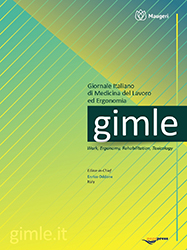[Work-related stress, shift and night work in the Police force]
Stress lavoro-correlato, il lavoro a turni e notturno nelle forze di Polizia
All claims expressed in this article are solely those of the authors and do not necessarily represent those of their affiliated organizations, or those of the publisher, the editors and the reviewers. Any product that may be evaluated in this article or claim that may be made by its manufacturer is not guaranteed or endorsed by the publisher.
Authors
The Police Officers (PO) is considered at high risk of work-related stress (WRS), for the presence of generic and specific risk factors. Acute stress is related to post-traumatic stress disorder, the "chronic stress" with the risk of burn-out. There is a significant association between WRS and absenteeism, development of mental disorders, risk of metabolic disorders, associated with cardiovascular risk.
Police Forces are designed to operate over 24 hours with shifts and night under highly WRS conditions, which results in reduced levels of safety and operational effectiveness.
As such it is considered in D.Lgs. 81/2008. The evaluation of the relationship between stress, health and productivity in the OCP, through validated self-administered questionnaires, it is essential to set the correct preventive strategies that constitute the winning tool for PO themselves and for society as a whole.
How to Cite

This work is licensed under a Creative Commons Attribution-NonCommercial 4.0 International License.
PAGEPress has chosen to apply the Creative Commons Attribution NonCommercial 4.0 International License (CC BY-NC 4.0) to all manuscripts to be published.






